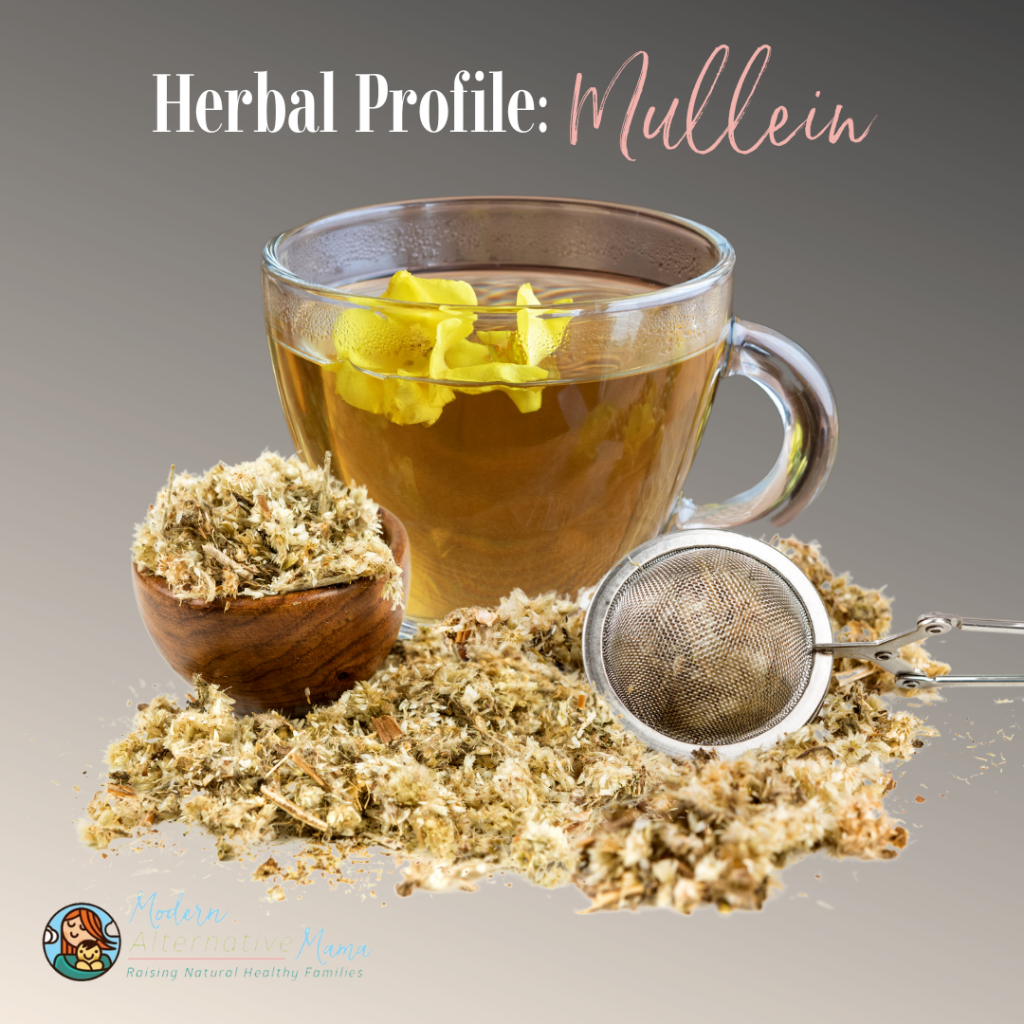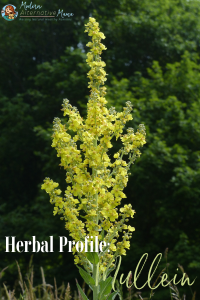By Danielle
What is Mullein?
Mullein, sometimes called Great Mullein, Flannel Plant, Candlewick Plant, Hag’s Taper, Velvet Dock, Velvet Plant, Clown’s Lung-wort, Torches, Our Lady’s Flannel, Jacob’s Staff, Aaron’s Rod, and many other names. Its scientific name is Verbascum, and it is native to North Africa, Asia, and Europe, though it can now be found throughout most of the world.
Mullein is a biennial member of the figwort (Scrophulariaceae) family and has wide, flat petals that are usually yellow in the United States. The petals grow on a flower spike up to 8 feet tall, while the leaves stay near the ground. The tell-tale leaves are large and fuzzy (1).
Health Benefits of Mullein
In ancient times, mullein was used for lighting torches and making candle wicks. But today, it is used as a natural health remedy worldwide. Mullein has several active compounds that give it such great healing properties, including (2):
- Saponins: anti-inflammatory, pain-relieving, and antitumor properties (3).
- Flavonoids: antioxidant and anti-inflammatory properties (4).
- Phenylethanoid glycosides: anti-inflammatory, antioxidant, and antiviral properties (5).
- Iridoids: anti-inflammatory properties (6).
Promotes Respiratory Health
Mullein leaves, flowers, and roots have been used for centuries to help coughs, bronchitis, asthma, and just about every respiratory issue under the sun. Mullein was traditionally used for tuberculosis (7). The flowers and leaves contain saponins that help rid the body of phlegm and mucilage, which soothes irritated membranes.
Native Americans often smoked the plant to cure asthma and used a tea of the roots to calm coughs. Mullein holds expectorant and demulcent effects, which accounts for this herb’s documented use as an antidote for the respiratory tract (8). I highly recommend Earthley’s Cough-B-Gone for these benefits.
Anti-Inflammatory Properties
Mullein is well-known for its anti-inflammatory properties, thanks to its wide array of plant compounds that assist in combating respiratory inflammation. Chronic inflammation has been linked with many diseases, such as type 2 diabetes, asthma, and certain cancers (9). Animal and human research suggest that mullein reduces inflammation and helps relax the muscles in the respiratory tract (10,11). I highly recommend Earthley’s Cough-B-Gone and Herbal Throat Spray for these benefits.
Antiviral Properties
Some test-tube studies indicate that mullein may have potent antiviral properties. An antiviral property is when a substance, or in this case, an herb, can kill a virus or suppress the virus’ ability to replicate, multiply or reproduce (12). One study found the Verbascum species to have antiviral activity against influenza A and herpes (13). Another study found combining the medication amantadine with mullein improved antiviral activity against influenza (14). I highly recommend Earthley’s Elderberry Elixir for these properties.
Antibacterial Properties
An antibacterial property is when a substance, or in this case, an herb, can destroy or suppress the growth and reproduction of bacteria (15). Studies have shown that mullein leaf has antibacterial properties in Gram-positive and Gram-negative bacterias such as Klebsiella pneumoniae, Escherichia coli (E. coli), and Staphylococcus aureus (16). I highly recommend Earthley’s Elderberry Elixir for these properties.
Astringent Properties
An astringent property is when a substance, or in this case, an herb, can cause the contraction or shrinkage of tissues and dry up secretions (17). Astringent herbs are typically used internally to reduce mucus and/or discharge and externally to remove the infection or unwanted bacteria from skin wounds. This makes mullein an excellent choice for infections.
One study found that a mullein ear drop used on a middle ear was just as effective as an anesthetic when used on a middle ear infection (18). I highly recommend Earthley’s Earache Ease for these properties.
Skin-Soothing Properties
Due to mullein’s anti-inflammatory and antibacterial properties, mullein can provide exceptional skin-soothing properties. Mullein has been used to assist in the healing of eczema, exanthema, cysts and zits, insect bites, and nail infections, as well as different types of wounds (19).
Additionally, mullein seeds have been used to soothe chilblains and chapped skin (20). That explains why Native Americans often used the leaves and flowers as a poultice for hemorrhoids, burns, tumors, and other skin problems. Mullein oil is excellent for post-birth hemorrhoids.
Safety Concerns
The mainstream narrative will tell you to talk to your doctor before using mullein due to no information on safety for use during pregnancy, breastfeeding, or in infants and young children, but herbalists say otherwise.
Notably, a trusted herbalist since 1989, Richard Whelan has had no documented adverse reactions or effects with this herb. He states there may be an increase in coughing, and cleansing of the lungs is expected with Mullein when it is taken for respiratory troubles, but this is not at all a bad sign but rather a sure indicator that the herb is doing its job! Otherwise, no adverse effects are expected from taking Mullein, even in high or frequent doses. It may be confidently taken during pregnancy or while breastfeeding and used by the young or old with safety (21).
Additionally, the mainstream mentions that some species of mullein may cause contact dermatitis. Although Richard Whelan does not say this, there is no harm in doing a patch skin test before topical use, especially if you have sensitive skin or are prone to allergic reactions.
How to Use Mullein
You can find mullein in dried bulk, teas, capsules, powders, extracts, oils, or tinctures. Tinctures always contain the most concentrated amount of herbs. Teas and soups are also options, especially when following ayurvedic medicine recipes. If you’re a DIY person, some great starter recipes are:
Follow the recommendations of any supplement; some of my recommendations include:
- Cough-B-Gone is a liquid supplement that combines elderberries and other immune-supporting herbs for everyday wellness. It’s an elderberry tincture (not syrup) that’s a potent cold and flu fighter, shelf-stable for up to 2 years, and super concentrated, which makes it the most cost-effective option.
- Earache Ease is the go-to, all-natural product for all ear complaints. Sinus Pressure? This can help. Swimmer’s Ear? We got you covered! Just plugged up and achey? No worries, we can help with that, too. This organic formula is strong enough to work for adults but gentle enough to ease earaches in kids.
- Elderberry Elixir is a liquid supplement that combines elderberries and other immune-supporting herbs for everyday wellness. It’s an elderberry tincture (not syrup) that’s a potent cold and flu fighter, shelf-stable for up to 2 years, and super concentrated, which makes it the most cost-effective option.
- Herbal Throat Spray provides relief from sore throats without compromising ingredients. This spray is infused with anti-viral herbs and has a pleasant, sweet flavor. Banish sore throats naturally with cooling peppermint while your immune system gets the support it needs.
- Pain Potion is an herbal tincture that helps to bring relief from headaches and other body pains. We combine five herbs to extract their anti-inflammatory, cooling, and soothing properties to help relax muscles and ease the pain. Skip the OTC pills and their dangerous side effects and opt for the natural help that Pain Potion can provide.
Disclaimer: This post is not intended as medical advice. These statements have not been evaluated by the FDA, and nothing in this post is intended to diagnose, treat, or cure anything. If you have questions, please do your own research or seek advice from a health professional.




How much of the cough syrup should be taken at one time? (i.e. One teaspoon? One tablespoon?)
Where’s a good place to get cherry bark?